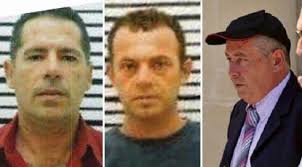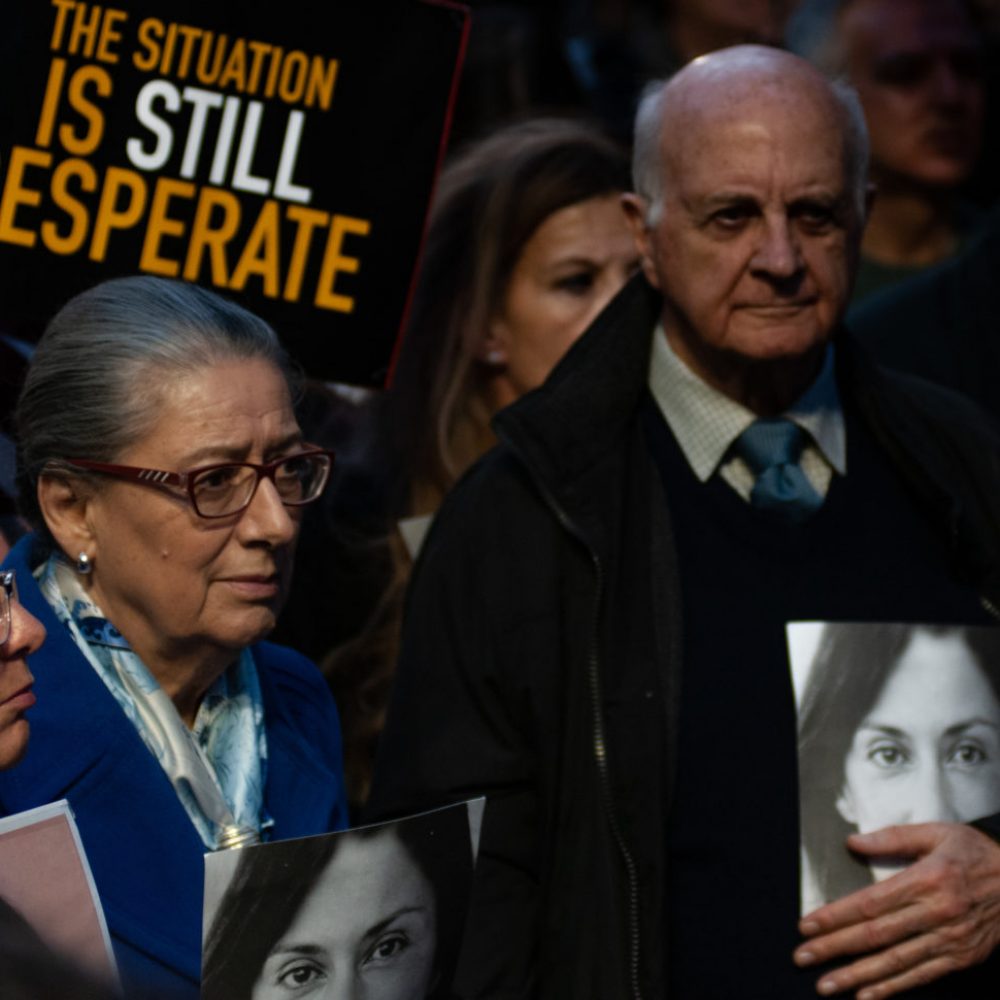Vince Muscat, one of the three hitmen accused of planting the bomb that killed journalist Daphne Caruana Galizia on 16 October 2017, pled guilty to all charges in court last week.
The sudden change was an unexpected twist in a case that has dragged on for more than three years.
The contract killer will serve a 15-year sentence and pay over €40,000 in court expenses after reaching a deal with prosecutors to provide information about the journalist’s murder, and about the unrelated killing of a lawyer. The case against the other two alleged hitmen – brothers George and Alfred Degiorgio – will now proceed separately.

Vince Muscat had been trying to strike a deal with prosecutors since April 2018. His offer was ignored by former prime minister Joseph Muscat, turned down by Prime Minister Robert Abela, and finally approved by Abela and his Cabinet last week — nearly three years after he first started talking.
The case against Vince Muscat and the Degiorgio brothers is based on hard evidence from the American FBI and Europol experts, who traced the killers movements by meticulous analysis of cell phone data in the days and hours leading up to Daphne Caruana Galizia’s murder.
Vince Muscat is unlikely to offer prosecutors new evidence against the alleged mastermind Yorgen Fenech. Middleman turned State’s witness Melvin Theuma was the buffer between the businessman and the hitmen, and he’s already testifying against both — again, in exchange for a presidential pardon absolving him of responsibility for his crimes.
The prime minister held a press conference immediately after Vince Muscat’s voluntary confession and conviction, hailing the plea bargain as evidence that “Malta’s institutions are working”.
Shortly after Vince Muscat made his deal with prosecutors, police arrested three men who are suspected of supplying the bomb used to assassinate the journalist.
The so-called ‘Tal-Maksar’ brothers, Adrian and Robert Agius, and their associate Jamie Vella had already been named by Theuma more than two years earlier in the compilation of evidence against Yorgen Fenech. They were among the 10 men arrested in the same police raid that led to the capture of the three hitmen, but they were released within 48 hours, as documented in a report prepared on the second anniversary of the journalist’s assassination by Reporters Without Borders and The Shift with the support of the Justice for Journalists Foundation.
Their intimate connection to organised crime, drug trafficking, smuggling, and a series of car bomb killings that played out over the last decade was common knowledge in Malta. Why did the institutions wait so long to reel them in?
Further questions were raised when the prime minister admitted he hadn’t recused himself from Cabinet discussions of Vince Muscat’s pardon. A lawyer by profession, Abela had personally represented the Agius brothers in 2012 and 2016. He was also legal counsel to Joseph Muscat prior to replacing the outgoing leader as his chosen successor when a month of anti-corruption protests in December 2019 drove Muscat from office.
Abela insisted there was no conflict of interest and that he had acted ‘according to his conscience’.
Police commissioner Angelo Gafa held a press conference following the late night arraignment of the alleged bomb suppliers to tell the nation the Caruana Galizia case has been wrapped up.
“With the evidence we have,” Gafa said, “we are in a position to say that every person involved, be it mastermind or accomplice, is under arrest or facing charges.” He made this statement after attempting to explain the difference between ‘intel’ and court-level ‘evidence’.
Despite the prime minister’s insistence that investigators have no evidence indicating a politician was involved in the murder, The Times of Malta published a story the next day claiming Vince Muscat told police that former Economy Minister Chris Cardona hatched a separate plot to kill the journalist in 2015, but that it was aborted when he failed to pay the Degiorgio brothers the agreed fee.
Investigators say they are treating Vince Muscat’s claims “with caution” despite the assassin’s plea bargain deal, as much of the information about the plot is based on hearsay evidence.
The ‘Cardona thesis’ first made headlines days after the arrest of the man accused of commissioning the murder, Yorgen Fenech, when it was revealed that his doctor had passed him a note from the former prime minister’s chief of staff Keith Schembri that outlined a plan to pin the murder on the Economy Minister at the time.
The scenario seemed plausible enough. Cardona had frozen Caruana Galizia’s bank account as part of a massive libel suit over her reports that he and his personal aide had been seen having a threesome in a German brothel while travelling on official business. He had also been seen with the hitmen who planted the bomb in the journalist’s car.
Cardona has always said he was being framed for the murder. As for Fenech, he told police that Keith Schembri was the real mastermind.
The same set of names has come up again and again in connection to the corruption that led to Caruana Galizia’s murder: Keith Schembri, Joseph Muscat, Konrad Mizzi and Yorgen Fenech.
While the police commissioner may have netted the small fry — the three hitmen, the middleman, the one who financed it, and the men who supplied the bomb — civil society activists are insisting that responsibility doesn’t end there, and neither does accountability, calling a public protest to make that point.
Parliamentary Secretary Rosianne Cutajar was the latest compromised politician to fall after her close connection to Yorgen Fenech was exposed in the media.
She resigned pending the outcome of an investigation by the Standards Commissioner into her conduct, which included accepting large sums of money and lavish gifts from Fenech. Messages were exchanged between Cutajar and Fenech days before she gave her first and only speech in the Parliamentary Assembly of the Council of Europe, attacking Special Rapporteur Pieter Omtzigt and his report that was key to the launch of a public inquiry in Malta.
“During four years in Strasbourg, she has done nothing: never co-signed a motion, never asked a question, never written a report, and only given one speech,” Omtzigt tweeted following revelations of her close relationship with the man accused of murdering the journalist.
Cutajar had stood up to argue that the mention of Fenech’s Dubai company 17 Black was irrelevant to the investigation into the Caruana Galizia’s assassination. We now know that Fenech’s offshore kickback vehicle was intimately tied to the Electrogas energy project Caruana Galizia was investigating at the time of her death.
Was last week’s leak another attempt to cloud the waters in a case plagued by judicial delays and political interference?
The only clear conclusion from these latest developments is just how many powerful people had a motive for silencing Daphne Caruana Galizia, and how badly the country’s compromised institutions failed in their duty to protect her life.
The following project is weekly Maltese Roundups prepared by The Shift News (Malta) offering the latest news in Daphne Caruana Galizia case.

